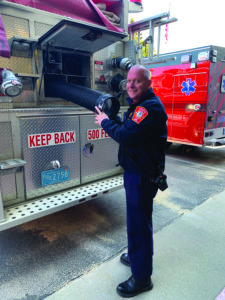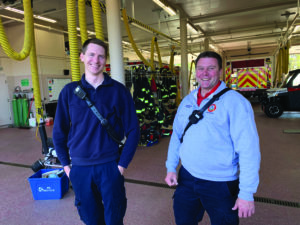TRURO — A regional study of emergency medical services in Truro, Wellfleet, and Provincetown, presented to the select board and finance committee on April 12, points to a phasing out of the Lower Cape Ambulance Association (LCAA).
The report recommends that Truro and Provincetown each establish their own municipal fire-EMS systems similar to Wellfleet’s current model.
For years, Provincetown’s fire dept. has been poised to end its contract with LCAA and build its own self-sufficient ambulance service — a move that would land Truro in a tough spot.
The two towns currently share the expenses of contracting the service, but if Provincetown pulls out, Truro would be hard-pressed to absorb the entire cost and would be forced to part ways with Lower Cape as well. While this may make fiscal sense, Truro has been wary of what losing the additional ambulance staffing might mean for its own personnel, given that the town’s fire dept. is already short-staffed.

Last fall, Truro Fire Chief Tim Collins told the Independent that “in an ideal world, Lower Cape would still be here — and we’d have additional firefighters.”
But since then, the town has warmed to the idea of letting go of LCAA. In bracing for Provincetown’s possible withdrawal from the contract, Truro solicited the regional study by Capital Strategic Solutions, a Marlborough-based consulting firm that specializes in municipal project management and oversight.
LCAA has been a “godsend to you for the last 80 years,” acknowledged Tom Impey, a consultant from Capital Strategic Solutions. But he questioned whether it could be a “viable entity without a significant increase in the cost to the town of Truro.
“This is certainly not an indictment of LCAA for doing a poor job,” Impey continued. “But your towns are growing. And they’re growing at such a rate that LCAA is not going to keep up unless they see a huge influx of cash from both the communities to buy more ambulances and hire more people.”
Currently, LCAA has been relying on equipment and personnel supplied by Provincetown’s and Truro’s municipal fire departments, much to the frustration of fire chiefs from both towns.
“There have been numerous times where your ambulance has been out of service for months at a time, and you’ve taken ours,” Collins said at the select board meeting, addressing his comments to the LCAA representatives. “You have experienced staffing issues where you’re not running at full staff, and it’s expected that Truro will supplement that.”
“Nothing against Lower Cape Ambulance,” Provincetown Chief Mike Trovato told the Independent, “but we’re paying them a million bucks a year, and they’re collecting all the ambulance revenues, while they’re using our trucks.”
Neither town is compensated when LCAA uses municipal ambulances, but Truro and Provincetown are on the hook to cover repairs and maintenance.

Impey had one disclaimer about LCAA’s finances, however. “This isn’t a money-making thing,” he pointed out. “Lower Cape Ambulance, remember, is a nonprofit. Everything they make goes back into the business, so it’s not like, ‘Oh, my goodness — this is a cash grab.’ No, Lower Cape, at the end of the day, operates on zero revenue.”
Already equipped with two town-owned ambulances, Truro is well positioned to switch over to a municipal EMS system, said Impey. The final stretch would involve hiring eight additional firefighter-paramedics, which would cost the town $800,000. But if Truro severs its contract with LCAA, which costs $430,000 annually, and then scoops up the $253,000 in revenue that LCAA has been collecting, what’s left is a net additional annual cost of $117,000, the study estimates.
Switching to crews of firefighter-paramedics could be a “force-multiplier,” Collins told the Independent. While LCAA crews are limited to EMS-only calls, the eight new firefighter-paramedics would be dual-trained in both fire suppression and EMS.
“You also have more control over that operation because they report directly to the board, the town manager, and the fire chief,” Collins added. “And you’ll not only increase your fire suppression capability in Truro but also to our neighboring towns, if we need to send people over for mutual aid.”
At the select board meeting, Impey added that this model could improve the town’s fire protection classification, which in turn could help lower residents’ insurance rates. “While there’s an increase in cost,” he said, “there’s an increase in benefit as well.”

For Provincetown, the regional study recommended hiring 16 full-time firefighter-paramedics, using the $1 million spent annually on the LCAA contract and the $600,000 in revenue that has been going to LCAA.
Trovato, however, is opposed to jumping quickly into this change. As long as he’s around, he said, he intends to keep the Provincetown Fire Dept. operating with 50-odd volunteers.
As for the EMS side, Trovato plans to hire LCAA employees after Provincetown ends its contract with the organization. “That way, no one would be out of a job,” he told the Independent. “They would be getting a better job with benefits. There’s a lot of people who work with Lower Cape who are fantastic. You don’t want to let them get away.”
Then, with a new “Provincetown EMS” in place, Trovato plans on hiring firefighter-paramedics, slowly building up a force of dual-trained personnel to take over “after we’ve gotten too old,” he said.



